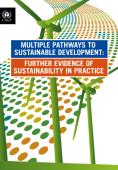The green economy policy discourse has devoted a lot of attention to the design of public policy addressing low-carbon technologies. In this paper the researchers examine the impacts of public R&D support and feed-in tariff schemes on innovation in the wind energy sector. The analysis is conducted using patent application data for four western European countries over the period 1977–2009. Different model specifications are tested, and the analysis highlights important policy interaction effects. The results indicate that both public R&D support and feed-in tariffs have positively affected patent application counts in the wind power sector. The (marginal) impact on patent applications of increases in feed-tariffs has also become more profound as the wind power technology has matured. There is also some evidence of policy interaction effects in that the impact of public R&D support to wind power is greater at the margin if it is accompanied by the use of feed-in tariff schemes.
The Green Economy (GE) paradigm aims to reconcile environmental and socio-economic objectives. Policies to deploy renewable energy (RE) are widely perceived as a way to tap the potential synergies of these objectives. It is, however, still largely unclear whether the potential of simultaneously achieving both environmental and socio-economic objectives can be fully realized, and whether and how multiple objectives influence policy design, implementation, and evaluation. The paper aims to contribute to this aspect of GE research by looking at selected country experiences of renewable energy deployment with respect to the socio-economic goals of job creation or energy access. Across the cases examined, the reseachers find the following implications of relevance for the GE framework: First, they confirm the important role of governmental action for GE, with the specific need to state objectives clearly and build monitoring capacity. Second, consistent with the “strong” green growth variant of GE, some of the cases suggest that while renewable deployment may indeed lead to short-term socio-economic benefits, these benefits may not last.
Energy efficiency policies play a key role in the transformation to a ‘green energy economy’. This article takes stock of the impacts of the existing energy efficiency policy instruments in Germany and reviews the energy, environmental and socioeconomic impacts of the country’s latest energy efficiency and climate strategies for the year 2020. The paper finds evidence supporting the findings of other studies that enhanced green energy policies will trigger tangible economic benefits in terms of GDP growth and new jobs even in the short term. Whereas policy makers have already acknowledged and implemented this conclusion in the case of renewable energies, this article shows that striving for more ambitious energy efficiency policies represents a similar win–win strategy, which should be exploited to a much larger extent.

In 2013, following the UNEP Governing Council Decision and with the support of the government of China, UNEP began work to share the South’s various experiences and national-level initiatives for transitioning to sustainable and socially inclusive economies. This work culminated in 2015 when UNEP published a report, entitled Multiple Pathways to Sustainable Development: Initial Findings from the Global South, that highlighted four unique national initiatives: Living Well in Bolivia, Ecological Civilization in China, Green Economy in South Africa, and Sufficiency Economy in Thailand.
This report serves to build on that earlier publication by examining four additional approaches that have been adopted at the country or regional level: Circular Economy in the European Union (EU) and Germany, Natural Capital Accounting in Botswana, Payment for Ecosystem Services in Costa Rica, and Gross National Happiness in Bhutan. The purpose is to show that there is no “one size fits all” approach to sustainable development, but rather a range of concepts, methodologies, and tools that can be used, depending on the specific context.
Globally, new forms of electromobility are challenging established transport technologies based on internal combustion engines. The authors explore how this transition is simultaneously unfolding in four countries, enabling them to shed some light on the dynamics and determinants of technological path creation. The paper's analysis covers two old industrialized countries (France and Germany) and two newly industrialized countries (China and India) with very different market conditions and policy frameworks. It reveals enormously different choices of technologies and business models and traces them back to four main drivers of divergence: technological capabilities, demand conditions, political priorities and economic governance.
